Rachel Borwein goes Jersey girl gone bad to play Comet in ‘The Eight: Reindeer Monologues’
 The Eight: Reindeer Monologues is on stage at Lab Theater now through December 20. As the name belies, the show consists of a series of eight monologues delivered by the members of Santa’s sleigh team, as they discuss the veracity and propriety of Vixen’s public allegations that Santa raped her in his toy shop at the North Pole.
The Eight: Reindeer Monologues is on stage at Lab Theater now through December 20. As the name belies, the show consists of a series of eight monologues delivered by the members of Santa’s sleigh team, as they discuss the veracity and propriety of Vixen’s public allegations that Santa raped her in his toy shop at the North Pole.
Combining humor with disquietude, playwright Jeff Goode’s monologues are for the most part hilarious. Nowhere is that more true than with the one delivered by Comet, played by Rachel Borwein.
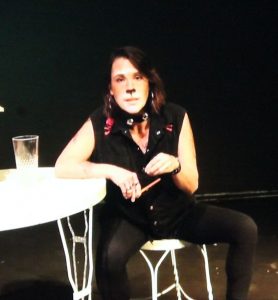 Borwein was last seen in the role of Maggie in The Studio Players’ production of Tennessee Williams’ Cat on a Hot Tin Roof. Her other credits include the roles of Suzette in Don’t Dress for Dinner for The Naples Players, Martha Livingstone in Agnes of God (2018), Night, Mother (2017) for The Studio Players and Petruchio in Taming of the Shrew. Director Brett Marston regards her as one of the most intelligent and interesting actors he’s ever had the pleasure of working with. “She is just a very interesting person, and I always love working with her. She’s phenomenal.”
Borwein was last seen in the role of Maggie in The Studio Players’ production of Tennessee Williams’ Cat on a Hot Tin Roof. Her other credits include the roles of Suzette in Don’t Dress for Dinner for The Naples Players, Martha Livingstone in Agnes of God (2018), Night, Mother (2017) for The Studio Players and Petruchio in Taming of the Shrew. Director Brett Marston regards her as one of the most intelligent and interesting actors he’s ever had the pleasure of working with. “She is just a very interesting person, and I always love working with her. She’s phenomenal.”
Indeed, she is 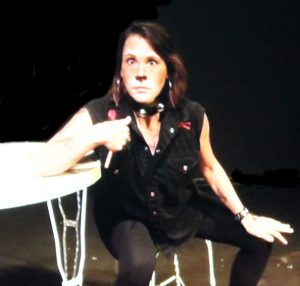 phenomenal as Comet, a character who’s Borwein’s polar opposite.
phenomenal as Comet, a character who’s Borwein’s polar opposite.
A reformed junkie, Comet is now a hardcore, unapologetic conservative who refuses to believe anything derogatory about her benefactor, St. Nick, who rescued her from the gutters, got her into rehab and helped her get and stay clean.
“When I first read the script, I saw Comet as a drugged out, in-recovery, kind of Narcotics Anonymous character,” Marston relates. “I shared that with Rachel, but she wanted to 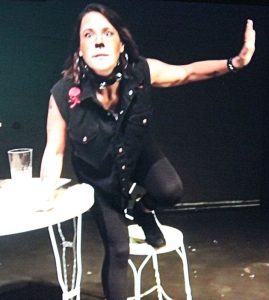 try something completely different. She approached it from almost a Marisa Tomei My Cousin Vinny point of view. It was just the furthest thing I saw in that character, but the minute she did it, it was so right. ‘OMG, Rachel,’ I said, ‘that was just perfect.’ It was a stroke of brilliance to come up with that slant on her part.”
try something completely different. She approached it from almost a Marisa Tomei My Cousin Vinny point of view. It was just the furthest thing I saw in that character, but the minute she did it, it was so right. ‘OMG, Rachel,’ I said, ‘that was just perfect.’ It was a stroke of brilliance to come up with that slant on her part.”
“Marisa Tomei wasn’t exactly my inspiration,” Rachel clarifies. “But it ended up being a little like that. I read the whole script and there’s a lot of heaviness in the play even though it’s a comedy. It’s deep and there’s a lot of darkness in there.  So I felt that my character’s monologue could do with a little bit of levity. So instead of playing Comet as a hardened drug addict, I thought of her as a Jersey girl who fell in with a bad crowd but is really a sweet person. That made it a lot more fun for me and works within the overall structure of the play.”
So I felt that my character’s monologue could do with a little bit of levity. So instead of playing Comet as a hardened drug addict, I thought of her as a Jersey girl who fell in with a bad crowd but is really a sweet person. That made it a lot more fun for me and works within the overall structure of the play.”
The lines playwright Jeff Goode puts in Comet’s mouth are some of the funniest in the play. But it’s a drinking straw that enables Borwein to focus her energy and the audience’s attention on what 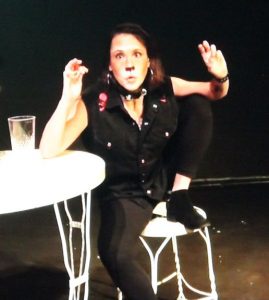 Goode has given her to say.
Goode has given her to say.
“We set her up in a café just having coffee,” Marston recounts. “Rachel produces this straw and starts fidgeting with it. [The prop] subtly brought out that recovering addict edginess I was looking for, that that anxiety, that nervousness. She played with it and twisted it and there was something about the connection with that straw that helped her find the truth in the story she was telling.”
Classic Borwein.
“Rachel is a thoughtful 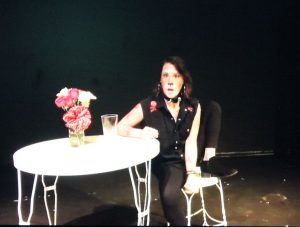 actress and spends a lot of time trying to find her character’s core, her truth,” Marston observes.
actress and spends a lot of time trying to find her character’s core, her truth,” Marston observes.
“If it doesn’t feel right, she’s going to keep digging.”
And Comet’s truth is that she’s a Santa loyalist. She sees in him a rescuer – akin to an emergency medical technician, firefighter or crewmember of a Coast Guard search and rescue 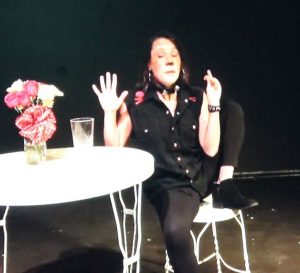 chopper. Vixen’s allegations of sexual assault are appalling because that kind of behavior is so antithetical to the man she knows.
chopper. Vixen’s allegations of sexual assault are appalling because that kind of behavior is so antithetical to the man she knows.
“She sees him as a father figure,” Borwein relates. “In her heart, she doesn’t think he could have done it. She sees him as a really, really good person and it just doesn’t make sense to her.”
As a result, Comet serves as a powerful counterpoint to Imani Williams’ Blitzen and her monologue 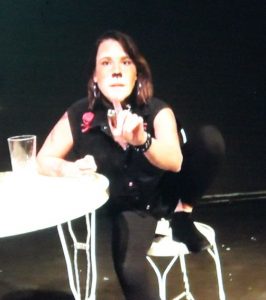 comes right after Blitzen’s.
comes right after Blitzen’s.
“Comet tells the story of her low point, and then it’s everything Santa’s done,” Rachel explains. “It’s like an apology for him [in the Greek sense of the term], but underlying that is a sense of desperation. Christmas is very important to Comet, and one of the ramifications of making these allegations is that you’re going to destroy the whole institution [of Christmas]. So you can’t take this person away. You can’t take Santa and you can’t take Christmas away. People are gossip mongering and essentially telling lies.”
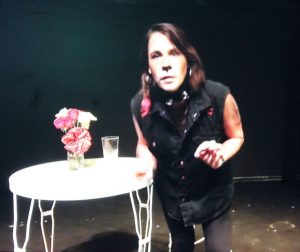 But Comet’s unwavering allegiance to Santa and the humor built into her monologue is disconcerting for the audience because, in the end, they are laughing at someone who is a blind-eye advocate for a serial rapist and child molester.
But Comet’s unwavering allegiance to Santa and the humor built into her monologue is disconcerting for the audience because, in the end, they are laughing at someone who is a blind-eye advocate for a serial rapist and child molester.
But, hey, even Harvey Weinstein, Jeffrey Epstein, Jerry Sandusky, Bill Cosby and Michael Jackson had their supporters. When it comes to heroes, mentors and role models, people would rather believe a lie that draws a 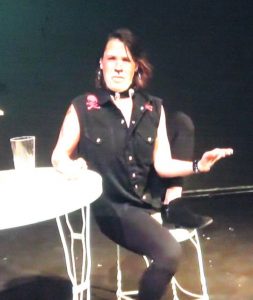 smile than the truth that draws a tear.
smile than the truth that draws a tear.
“That’s the thing with the play,” Rachel adds. “There’s this deeper contextual stuff and there’s these funny jokes.”
The fact that Marston cast a woman in the role of Comet is yet another reason that Comet’s steadfast allegiance to Santa is disconcerting.
“The role was written for a male,” note Borwein. “That’s one reason I chose to go opposite and play her as a really girly character. I knew I had been cross-cast in a male role. But in some ways there’s almost more 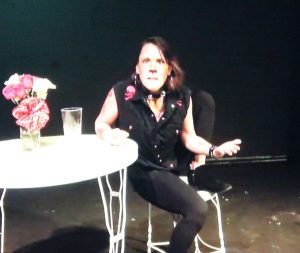 power in having a woman defending the perpetrator because there’s an expectation that a woman is going to believe another woman.”
power in having a woman defending the perpetrator because there’s an expectation that a woman is going to believe another woman.”
It’s more predictable to have a man playing that role, so having a woman play that role makes it a little more interesting.
“But Comet is not just a Santa apologist, she’s perhaps an anti-feminist too,” Marston speculates.
The 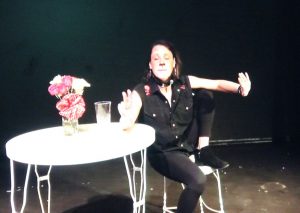 gender switch certainly opens this particular monologue to myriad avenues of interpretation, verisimilitude and present-day relevancy. As a female, Comet’s intractable allegiance to Santa carries the implication that Comet embraces a patriarchal social structure that treats women as inferior.
gender switch certainly opens this particular monologue to myriad avenues of interpretation, verisimilitude and present-day relevancy. As a female, Comet’s intractable allegiance to Santa carries the implication that Comet embraces a patriarchal social structure that treats women as inferior.
“I was thinking of these very right wing women who support the very 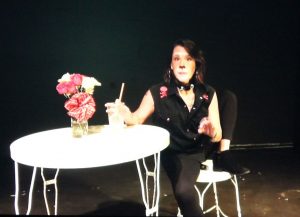 system that oppresses women,” Rachel remarks. “That exists, obviously.”
system that oppresses women,” Rachel remarks. “That exists, obviously.”
By aligning themselves with the white male power structure, conservative women presumptively believe that no matter how poor or socially disadvantaged they may be, they are superior to all those categories of people who are disparaged by the system, such as people of color, immigrants, members of the LGBTQ 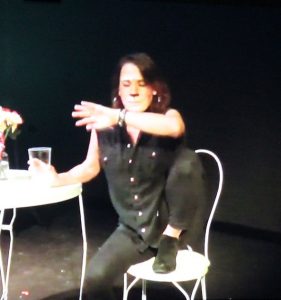 community and, yes, victims of sexual harassment and assault. In reality, though, espousing conservative, patriarchal principles is no get-out-of-jail-free card – as Gretchen Carlson, Megyn Kelly, Julia Roginsky, Andrea Tantaros, Laurie Dhue and Andrea Mackris discovered to their chagrin at Fox News.
community and, yes, victims of sexual harassment and assault. In reality, though, espousing conservative, patriarchal principles is no get-out-of-jail-free card – as Gretchen Carlson, Megyn Kelly, Julia Roginsky, Andrea Tantaros, Laurie Dhue and Andrea Mackris discovered to their chagrin at Fox News.
So out of a combination of loyalty and gratitude to the man who saved her life, Comet defends a patriarchal system that treats women as second class citizens. But does that also mean that she’s a female misogynist?
That’s a thing.  In fact, some evidence suggests that on social media outlets like Twitter and Facebook, women use misogynistic language more frequently than men do.
In fact, some evidence suggests that on social media outlets like Twitter and Facebook, women use misogynistic language more frequently than men do.
Before proceeding, a little etymology is in order. Misogyny is the dislike of, contempt for or ingrained prejudice against women. And the logical consequence of blindly supporting and stridently defending a patriarchal social structure is ingrained prejudice against women.
Psychologist  Berit Brogaard believes that not only can women be misogynists, but there are actually four types or categories of female misogynists!
Berit Brogaard believes that not only can women be misogynists, but there are actually four types or categories of female misogynists!
The first is the Misogynistic Puritan, who postulates that the ideal woman is domestic, subservient, nurturing, kind, mild-tempered, alluring, youthful and sexually pure prior to marriage. This type of female misogynist believes it is her mission in life to discipline females who deviate from this standard and ultimately get them back on the right track. Borrowing a character from a popular sitcom that is still in syndication, 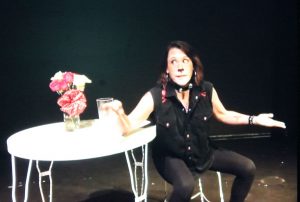 Marie Romano from Everyone Loves Raymond would be an example of a Misogynistic Puritan.
Marie Romano from Everyone Loves Raymond would be an example of a Misogynistic Puritan.
The second category of female misogynists is the Misogynistic Self-Critic. Women occupying this category are disdainful toward women who are not very feminine, whether it’s because they choose not to be or because  they are just bad at acting in a traditional way. Thus, the women in this group excoriate females who are too big, too fat, to masculine, too loud, too competitive, too hardcore or too alpha – like Hillary Clinton, Nancy Pelosi, Kamala Harris and Elizabeth Warren.
they are just bad at acting in a traditional way. Thus, the women in this group excoriate females who are too big, too fat, to masculine, too loud, too competitive, too hardcore or too alpha – like Hillary Clinton, Nancy Pelosi, Kamala Harris and Elizabeth Warren.
A third type of female misogynist is The She-Devil. [Dr. Brogaard’s label, not the author’s.] The women in this group see themselves as superior to other women and on a level with, if not above, the top alpha males they encounter. In their view, other women are manipulative, dishonest,  irrational, incompetent or unintelligent. They are not just in competition with other women. They are exceptions to the norm. And so they seek to prevent members of their own gender from succeeding in any capacity in the belief that they need to use every weapon at their disposal to protect their position in the social structure.
irrational, incompetent or unintelligent. They are not just in competition with other women. They are exceptions to the norm. And so they seek to prevent members of their own gender from succeeding in any capacity in the belief that they need to use every weapon at their disposal to protect their position in the social structure.
Finally, there’s the Misogynistic Self-Loather. Unlike the She-Devil, the Self-Loather regards all women, including herself, as manipulative, promiscuous, dishonest, irrational, incompetent and unintelligent. They have no real power. The men in their lives are ultimately in control. Yet they identify with their oppressors and participate 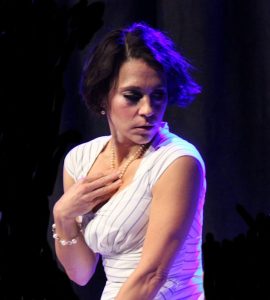 in the dehumanization of their own gender because their contempt for their own gender is the only thing that gives them some semblance of order in an incomprehensible and unjust world. Hulu’s dystopian television series The Handmaid’s Tale (adapted from Margaret Atwood’s novel of the same name) offers several examples of misogynistic self-loathers.
in the dehumanization of their own gender because their contempt for their own gender is the only thing that gives them some semblance of order in an incomprehensible and unjust world. Hulu’s dystopian television series The Handmaid’s Tale (adapted from Margaret Atwood’s novel of the same name) offers several examples of misogynistic self-loathers.
Whether this categorization offers any insight or understanding of the subject, it’s clear that women around the globe have adopted and stridently express misogynistic views. Whether this is  a manifestation of Stockholm Syndrome, trauma bond or some other psycho-social construct is unclear, but by casting Comet as a female, Marston raises this and a host of other interesting metaphorical issues.
a manifestation of Stockholm Syndrome, trauma bond or some other psycho-social construct is unclear, but by casting Comet as a female, Marston raises this and a host of other interesting metaphorical issues.
“The play is an allegory for the #metoo movement,” Rachel concede. Even though Goode wrote the script in 1994, the  reality is that the issues aren’t new.
reality is that the issues aren’t new.
“It’s an allegorical play about men in power abusing people who don’t have power, which is obviously not new whether or not it was in the social consciousness in this exact form in the ‘50s, the ‘70s, the ‘90s or right now. whenever. How they’re addressed may be different in different eras or time periods, the issues are the same.”
But allegorical  significance aside, there’s another reason that Borwein was eager to play the role of Santa-apologist Comet.
significance aside, there’s another reason that Borwein was eager to play the role of Santa-apologist Comet.
“I wanted to do the role because the character is so opposite to me. That’s a challenge. How do I make this real – because I would never say the things that come out of Comet’s mouth. I would be Blitzen. But Blitzen is so in the news [in the past few years] that it’s exciting to be playing the opposite. It’s fun, though, to convincingly play someone you’re not at all like.”
The Eight: Reindeer Monologues airs three times on LabTV. Go here for play dates, times and digital pass information.
December 10, 2020.














 Tom Hall is both an amateur artist and aspiring novelist who writes art quest thrillers. He is in the final stages of completing his debut novel titled "Art Detective," a story that fictionalizes the discovery of the fabled billion-dollar Impressionist collection of Parisian art dealer Josse Bernheim-Jeune, thought by many to have perished during World War II when the collection's hiding place, Castle de Rastignac in southern France, was destroyed by the Wehrmacht in reprisal for attacks made by members of the Resistance operating in the area. A former tax attorney, Tom holds a bachelor's degree as well as both a juris doctorate and masters of laws in taxation from the University of Florida. Tom lives in Estero, Florida with his fiancee, Connie, and their four cats.
Tom Hall is both an amateur artist and aspiring novelist who writes art quest thrillers. He is in the final stages of completing his debut novel titled "Art Detective," a story that fictionalizes the discovery of the fabled billion-dollar Impressionist collection of Parisian art dealer Josse Bernheim-Jeune, thought by many to have perished during World War II when the collection's hiding place, Castle de Rastignac in southern France, was destroyed by the Wehrmacht in reprisal for attacks made by members of the Resistance operating in the area. A former tax attorney, Tom holds a bachelor's degree as well as both a juris doctorate and masters of laws in taxation from the University of Florida. Tom lives in Estero, Florida with his fiancee, Connie, and their four cats.